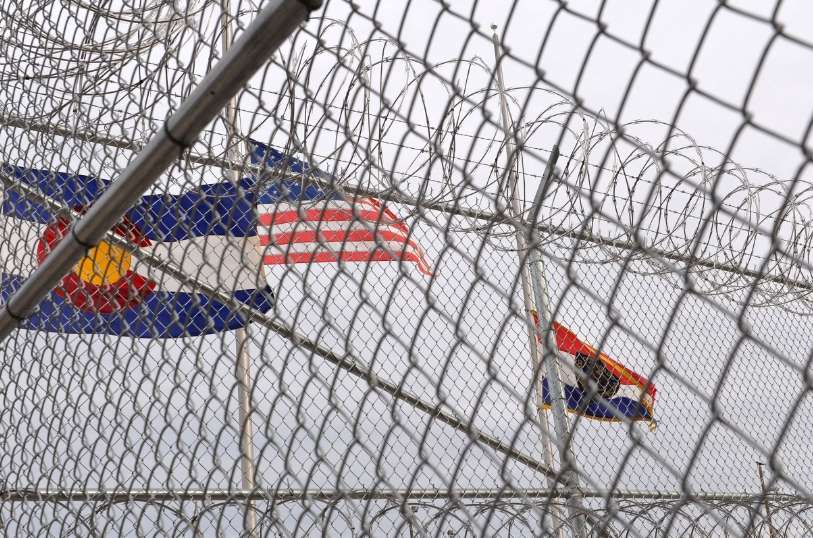Legal Dispute Concerning the Cuban Migrant Program
The Trump administration’s decision to repurpose Guantanamo Bay as a detention center for migrants has reignited a long-standing debate over immigration policy, human rights, and the legal complexities of offshore detention. This move, ostensibly aimed at addressing overcrowding in domestic detention facilities and deterring illegal immigration, has drawn sharp criticism from human rights organizations, legal experts, and members of Congress, who raise concerns about the potential for human rights abuses and the circumvention of constitutional protections. The historical precedent of using Guantanamo to detain Haitian and Cuban asylum seekers in the 1990s, along with its more recent association with the post-9/11 detention of terror suspects, casts a long shadow over its current repurposing, raising questions about the ethical implications of using a facility with such a controversial past for detaining migrants.
The administration’s justification for using Guantanamo rests on several key arguments. Firstly, it claims that the facility provides a necessary solution to the overcrowding crisis in existing detention centers within the United States. Secondly, proponents argue that detaining migrants at Guantanamo serves as a powerful deterrent, discouraging illegal immigration by demonstrating the government’s commitment to strict enforcement measures. Thirdly, the administration asserts that the individuals being detained at Guantanamo are “high-priority” migrants with criminal records, often citing the “Tren de Aragua” gang as a prime example. However, the lack of transparency surrounding the specific crimes of these detainees raises concerns about due process and the potential for arbitrary detention. The administration’s reliance on the recently enacted Laken Riley Act, which mandates the detention of undocumented individuals accused of theft or violent crimes, further complicates the legal landscape.
The legal implications of detaining migrants at Guantanamo are complex and fraught with potential challenges. Legal experts warn that offshore detention allows the government to sidestep constitutional protections and operate outside the usual parameters of judicial oversight. While the Supreme Court’s 2004 Rasul v. Bush decision affirmed the right of Guantanamo detainees to challenge their detention, the Trump administration may attempt to argue that immigration detainees are not afforded the same rights as those held as enemy combatants. This legal gray area sets the stage for potential court battles and raises fundamental questions about the extent to which the government can curtail the rights of individuals detained outside U.S. territory. The ACLU and other advocacy groups have expressed serious concerns about the potential for human rights violations, arguing that detainees at Guantanamo may face indefinite detention without access to adequate legal representation or due process.
The broader political context surrounding this decision cannot be ignored. The move to detain migrants at Guantanamo aligns with the Trump administration’s broader hardline stance on immigration, characterized by increased border security measures, stricter enforcement of immigration laws, and a rhetoric that often portrays migrants as a threat to national security. Critics argue that this policy shift represents a dangerous erosion of human rights and due process, while supporters maintain that it is a necessary response to a growing immigration crisis. The administration’s rhetoric, including statements by officials like Tom Homan, Trump’s former border czar, who referred to the detainees as the “worst of the worst,” further fuels the controversy and contributes to a polarized public discourse.
The lack of transparency surrounding the criteria for detention and the potential for indefinite detention without due process have prompted calls for greater oversight and accountability. Members of Congress and advocacy groups are demanding congressional hearings to investigate the conditions at Guantanamo and ensure that detainees’ rights are being protected. The potential for lengthy and costly legal battles looms large, as the administration’s policies are likely to be challenged in court by civil rights organizations and legal advocates. The outcome of these legal challenges will have significant implications for the future of immigration policy and the use of Guantanamo Bay as a detention facility.
Ultimately, the decision to detain migrants at Guantanamo Bay raises fundamental questions about the balance between national security concerns, human rights, and the rule of law. The historical context, the legal complexities, and the polarized political climate surrounding this issue highlight the profound challenges facing policymakers and the urgent need for a comprehensive and humane approach to immigration reform. The long-term consequences of this policy remain uncertain, but the potential for lasting damage to the United States’ reputation as a defender of human rights is a significant concern for many observers, both domestically and internationally. The unfolding legal battles and the ongoing public debate will shape the future of Guantanamo’s role in immigration enforcement and the broader trajectory of U.S. immigration policy.
Share this content:












Post Comment